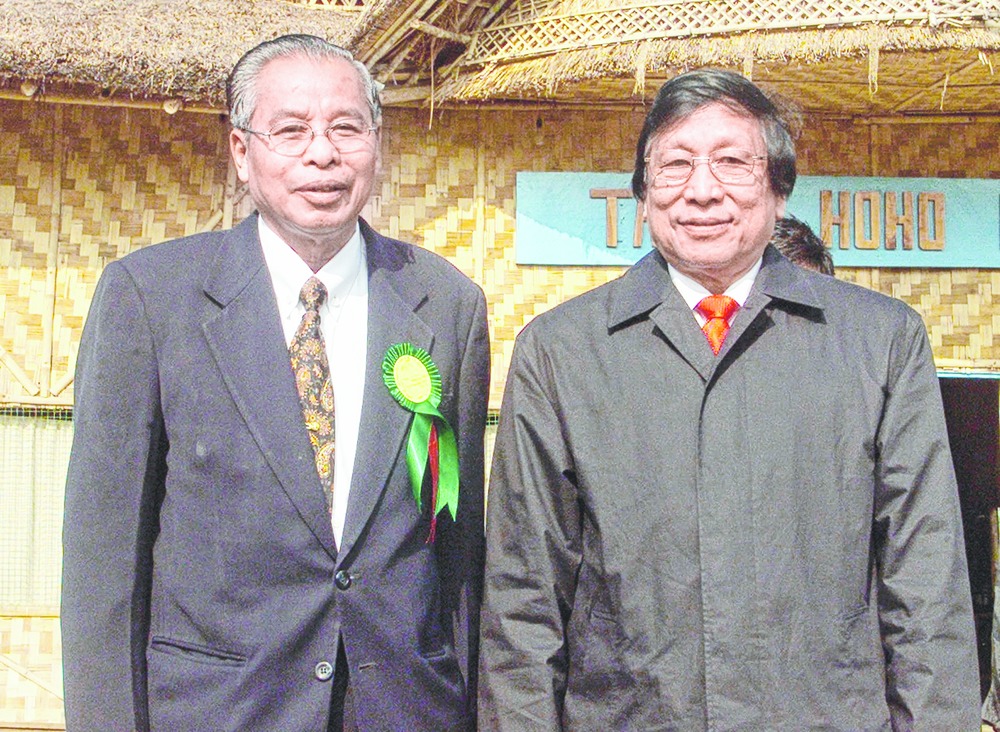
Described variously as an intellectual guerrilla or a gentle rebel, chairman of the most powerful rebel group in Northeast India, Isak Chishi Swu, 86, died today.
Not even his detractors deny him the virtues of loyalty to the Naga cause and faith in god, earning him the sobriquet of a gentleman rebel across the northeastern states.
Swu, a holder of degree in politics and economics from Gauhati University, may have preferred to continue studies at a Baptist Seminary in the West. Destiny, however, had other ideas.
As "foreign secretary" of the "Federal Government of Nagaland", he was to confer with the Indian foreign secretary and participate in the six rounds of talks with Prime Minister Indira Gandhi.
During the over 70 rounds of talks with the government of India, he represented the NSCN's soft diplomatic face since 1998. Whether it was Bangkok or New Delhi, top officials would feel compelled to stop a few minutes for the prayer that Swu would recite at the beginning of formal talks.
For the NSCN, a chunk of history has been suddenly taken away, a softness removed, leaving behind a void that may tempt political uncertainty.
Swu was too big, too important a man to be lost without seeing the end of India's oldest insurgency.
Before dying, however, Swu signed an important document last year paving way for a final settlement between Delhi and his organisation, the National Socialist Council of Nagalim (Isak-Muivah). Top rebel leaders and government officials went to the hospital to videograph Swu putting his signature on the agreement that Prime Minister Narendra Modi has described as historic.
Swu's importance as a top leader from Nagaland - his associate and ato kilonser or "prime minister" Thuingaleng Muivah is from the Tangkhul Naga tribe in Manipur - was on the top of minds while signing the framework agreement.
Nor is his importance diminished in the minds of rival factions.
"He has given his entire life for the national cause," said "general" Thinoselie Keyho of the Phizo-led Naga National Council (NNC).
Once a companion while training in East Pakistan, "general" Thinoselie reminisced Swu's leadership not just in Pakistan but also as the latter along with "general" Mowu, led a batch of 400 rebels to China in 1967-69.
Born in 1929 to Kushe Chishi Swu at Chishilimi in Zunheboto district, Swu belongs to the Sema Naga tribe. The tribe has not only given its share of warriors in the likes of "general" Kaito or leaders like Kughato Sukhai, the tribe has been one of the most important groups both in underground and overground politics.
So, when a part of the Sema leadership was in the midst of intrigue in the NNC, Swu was entrusted to lead a contingent to China.
It was after the 1975 Shillong Accord between the NNC and the government of India that differences arose between leaders like Thinoselie on one side and Swu, Muivah and S.S. Khaplang on the other.
Swu, Muivah and Khaplang formed the NSCN on January 31, 1980, in opposition to the "sellout" that they saw in the Shillong Accord. Eight years later as decks were cleared for the NSCN (I-M) to be formed, at a Myanmar hamlet close to the Indian border, Khaplang would try to put an end to his associates Muivah and Swu.
It was here that a leader from the Konyak tribe is said to have stepped in to stop a bloodbath that could have changed the course of history.
"General" Khole Konyak, a grand old man perhaps holds out the guiding light as Swu departs leaving behind some political uncertainty. Konyak is one of the potential successors to Swu as he enjoys shared history and, a favourable geography as the NSCN tries to realise a pan-Naga dream.
Even during the early days of factionalism within the NNC in the 1960s, it was Swu who was credited with calling for peace and asking people to "stop attacking each other". Decades later, the pious rebel leader was the best face for reconciliation on whom Muivah depended.
He last visited his native village in 2012.
Swu's departure begs the question of who will provide the soft even unexpressed, diplomacy that he was capable of.










